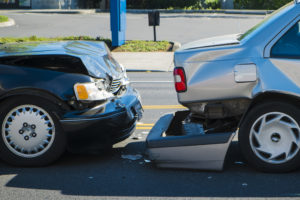Understanding Rear-End Accidents in Orlando
 Rear-end accidents are somewhat self-explanatory. They occur if the front of one car impacts the rear of another. The most common reason this type of accident occurs is that the leading car stops or slows down suddenly, and the car behind doesn’t have enough time to stop or slow down to prevent an accident. In some situations, one accident like this can lead to a chain reaction and involve multiple drivers. Understanding more about rear-end accidents can help you know what to do if you are involved in one. Knowing who is at fault may seem cut and dry, but this isn’t always the case. Because of this, you need more information about what to do and expect when involved in this type of accident. It is also wise to contact the experienced Rear End Accident Lawyer at The Law Offices of Pardy & Rodriguez.
Rear-end accidents are somewhat self-explanatory. They occur if the front of one car impacts the rear of another. The most common reason this type of accident occurs is that the leading car stops or slows down suddenly, and the car behind doesn’t have enough time to stop or slow down to prevent an accident. In some situations, one accident like this can lead to a chain reaction and involve multiple drivers. Understanding more about rear-end accidents can help you know what to do if you are involved in one. Knowing who is at fault may seem cut and dry, but this isn’t always the case. Because of this, you need more information about what to do and expect when involved in this type of accident. It is also wise to contact the experienced Rear End Accident Lawyer at The Law Offices of Pardy & Rodriguez.
Rebuttable Presumption in Florida
Something called rebuttable presumption is used in Florida. This is when the rear driver is assumed at fault for the accident that occurred. This is because the state of Florida has made it illegal for drivers to follow other vehicles on the road too closely. This means that you don’t have to have evidence or prove negligence to prove someone rear-ended your vehicle.
A common misconception in these accident cases is that it is the rear driver that is always at fault. However, sometimes, this driver can change the outcome of the case by showing evidence that the driver in front is the one who did something wrong.
In some situations, the driver in the rear is not responsible or shares responsibility with another party, including the injured person. This is referred to as comparative negligence in Florida. This means that juries may wind up assigning a certain percentage of the blame for the accident to everyone involved. However, this is only the case when there is clear evidence the driver in front did something wrong.
Common Defenses for Rear-End Collisions
Any type of unexpected, sudden, or illegal stop can result in the lead driver being, at least, partly to blame. Keep in mind, though, stopping suddenly at an intersection is not considered unexpected. That’s because drivers should already expect that this may occur due to the presence of emergency vehicles, vehicles running red lights, or pedestrians.
Cases of mechanical failure in the rear vehicle could reduce the rear driver’s liability and blame.
If several vehicles are involved in multiple impacts, then the third vehicle in the chain may also be partly to blame for the injuries suffered by the front car.
It is important to note that the above scenarios are just examples. Not every rear-end accident will have someone who is clearly at fault. While this is true, most will. It is important to note that all drivers must act reasonably. Sometimes, this can be an unclear standard. Because of this, the jury may have to determine who is to blame and what level of blame is on their shoulders.
Damages and Compensation in Orlando Rear-End Accidents
Since some rear-end accidents result in more damage to the vehicles than the people inside, some believe that the main worry is ensuring everyone has adequate insurance to cover damages.
But, with rear-end accidents, damages aren’t always that simple. It may go beyond dents and dings and whiplash. The injuries that occur may cause long-term disabilities or death for individuals in one or both vehicles. If a rear-end accident occurs at high speeds, problems like herniated discs, spinal cord injuries, amputations, traumatic brain injuries, fractures, and nerve damage may occur.
Even rear-end accidents that occur at lower speeds can result in serious damage. An accident involving a rear car that was going under 20 miles per hour can cause cervical and neck injuries, fractures, and soft tissue damage. That’s because the impact forces the bodies of the drivers and passengers forward, and their heads remain stationary.
What’s the Value of Your Orlando Rear-End Accident Case?
An attorney can provide more in-depth information about the value of your case, but they first need to speak with you and acquire all the details. When they learn the facts of your case, they can begin to put a value on the compensation you should receive.
During this process, your attorney will likely:
- Talk to you about the accident
- Talk to people in your life to gain insight into how the accident impacted your life
- Gather evidence related to your losses
- Talk to any accident witnesses
- Speak to doctors who have treated accident-related injuries
- Determine current and long-term losses
Working with an attorney is one of the best ways to secure the compensation you deserve after being involved in a rear-end accident. Make sure you put time and effort into finding an attorney who can handle the case and ensure your rights are protected. If you have a case or questions about a potential case, contact our team at The Law Offices of Pardy & Rodriguez by calling (888) 522-0222.


